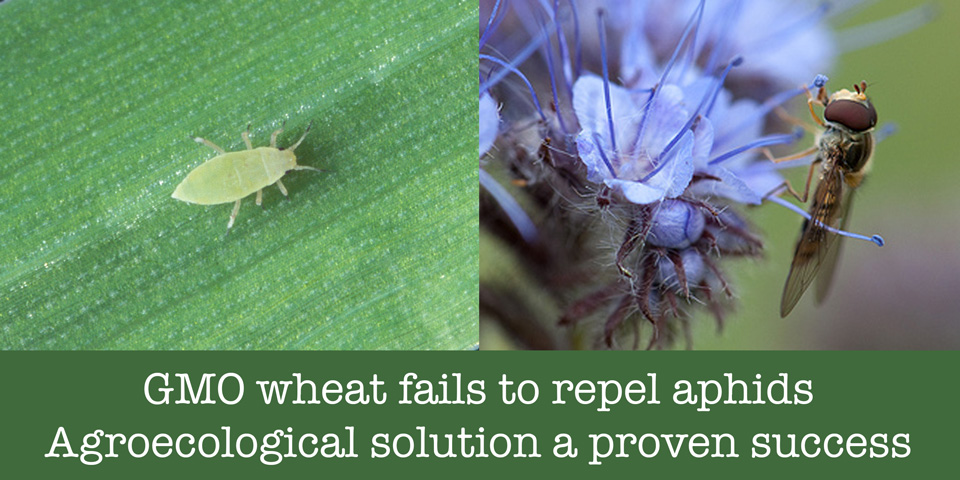
Agroecological solution to aphids in wheat already exists
Rothamsted Research in the UK wasted £1 million of taxpayers’ money on a failed GMO wheat trial. The researchers said they were “disappointed” with the results.
The GMO wheat was engineered with synthetic genes to mimic an aphid distress signal that was supposed to repel aphid pests. Rothamsted had presented the project as a way to reduce insecticides in wheat production.
But the wheat didn’t work in the field. Insect pests adapt quickly, and predictably the aphids quickly got used to the alarm pheromone that was meant to repel them.
In fact one type of aphid used in the trial had already got used to the alarm pheromone in the lab trials carried out before the project progressed to open field trials, according to the scientific paper about the GM wheat trial published today by the researchers in the journal Scientific Reports.
The Rothamsted researchers should explain to the public why taxpayer money was wasted on progressing the project to the open field stage when the first signs of failure were already evident in the lab.
In fact it is unclear why this doomed-from-the-start GMO research project was given the go-ahead at all, since an agroecological non-GMO solution to the problem of aphids in wheat was shown to work as long ago as the mid-1990s.
In this long-term research project, which included substantial input from Rothamsted, aphid populations in cereal and brassica crops were successfully controlled by encouraging native pest predators. No genetic engineering was needed: the system relied on planting flower strips around the field in combination with installing aphid-repelling pheromone strips on canes in the field.
Shamefully, Rothamsted abandoned these sensible and sustainable methods to focus on GM in line with the transgenic faddism that has overtaken the British government and scientific research base. Genetically modifying wheat is an unproven, expensive method that could result in a toxic or allergenic crop – no toxicity studies were done on the GM wheat before it was released in open field trials.
What’s more, there is no market for GM wheat. That doesn’t seem to have occurred to the Rothamsted gene-bashers, who appear to have learned nothing from the failed trial. In the press materials released by Rothamsted, the researchers are trying to drum up support for “lines of potential future enquiry”, which include attempting to further genetically engineer the wheat plants to give off the pheromone only when an aphid arrives.
Instead Rothamsted should remind itself of the basics of good farming: encouraging biodiversity to attract pest predators; planting naturally pest-resistant crops; practising rotation and companion planting; and building healthy soils to support healthy plants. Meanwhile the British government must wean itself off its unhealthy obsession with GMO magic bullets and put taxpayers’ money into researching the sustainable and safe farming solutions that the public want.
The full scientific paper by the Rothamsted researchers about the GMO wheat failure is here: http://www.nature.com/srep/2015/150625/srep11183/full/srep11183.html